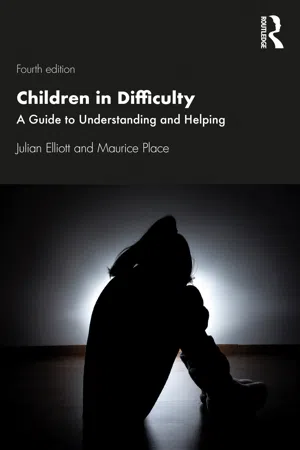
- 320 pages
- English
- ePUB (mobile friendly)
- Available on iOS & Android
About this book
This fully updated fourth edition of Children in Difficulty explores some of the most common, yet incapacitating, difficulties often encountered by young children and adolescents. Drawing on the latest research and with case studies throughout, chapters cover topics such as challenging behaviour and school refusal, eating disorders, anxiety and depression, substance misuse, neurodevelopmental disorders, dyslexia and dyspraxia.
The book provides a deeper understanding of each difficulty, considering the complexities of each problem at depth and analysing the best forms of intervention. It includes insights from the fields of genetics and neuroscience, and ensures that claims for the effectiveness of specific interventions are supported by rigorous scientific evidence.
Features of this new edition include:
- Up-to-date insights from the fields of psychology, genetics and neuroscience
- Recognition of the increasing impact of social media and the internet on children and young people.
Written by experts in the field, this book distils high level scientific and clinical knowledge in a way that is accessible to professionals from a range of child-care disciplines. It will be of significant value to those working in education, health or social care, and anyone who needs to be able to recognise and help children in difficulty.
Frequently asked questions
- Essential is ideal for learners and professionals who enjoy exploring a wide range of subjects. Access the Essential Library with 800,000+ trusted titles and best-sellers across business, personal growth, and the humanities. Includes unlimited reading time and Standard Read Aloud voice.
- Complete: Perfect for advanced learners and researchers needing full, unrestricted access. Unlock 1.4M+ books across hundreds of subjects, including academic and specialized titles. The Complete Plan also includes advanced features like Premium Read Aloud and Research Assistant.
Please note we cannot support devices running on iOS 13 and Android 7 or earlier. Learn more about using the app.
Information
Chapter 1
Introduction
Influences upon development
Genetics
Epigenetics
Table of contents
- Cover
- Half Title
- Title Page
- Copyright Page
- Table of Contents
- List of tables
- Chapter 1: Introduction
- Chapter 2: The basics of being helpful
- Chapter 3: School refusal
- Chapter 4: Oppositional defiance, conduct and attachment disorders
- Chapter 5: Eating disorders
- Chapter 6: Anxiety, stress and trauma
- Chapter 7: Neurodevelopmental disorders and obsessive compulsive disorder
- Chapter 8: Disruptiveness and challenging behaviour in schools and classrooms
- Chapter 9: Addiction and substance misuse
- Chapter 10: Depression and self-harm
- Chapter 11: Dyslexia
- Chapter 12: Developmental coordination disorder (dyspraxia)
- Index